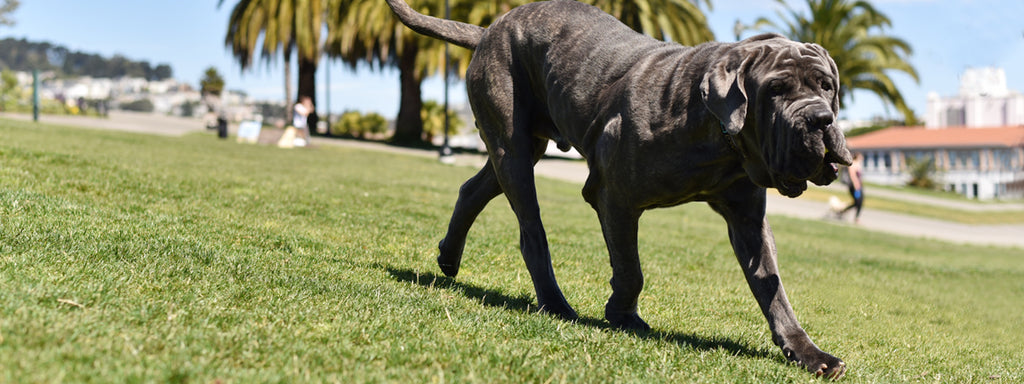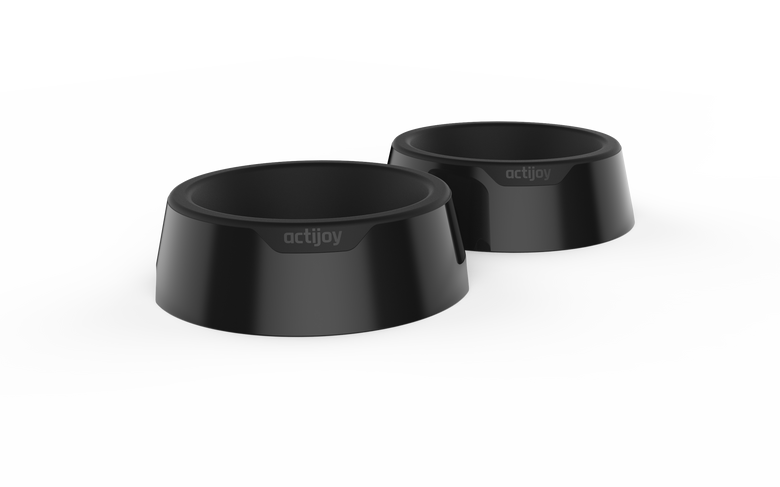All You Need To Know About Large-Breed Puppies’ Nutrition

A healthy puppy is a happy puppy. To sustain that happiness a puppy needs proper nutrition. As each puppy is unique, as responsible dog parents, we need to see to their unique nutrition needs as well.
This is true especially for large-breed puppies because they have a genetic tendency for rapid growth. Extra care and caution are required to maintain the nutrition needs of large-breed pups.
But no worries! We are here with a complete guide to ensure that your precious get the nutrition required for a proper growth and a healthy lifestyle.
Why Is Proper Nutrition Important
Large-breed puppies are inclined to quite a few health issues such as orthopedic diseases, rickets, and other developmental diseases. Lack of vitamin D, calcium, phosphate, and other essential growth nutrients are which causes these disorders.
This is due to their potential genetic excessive speedy growth. As you can see, a suitable diet can save your pup and you from a lot of unnecessary pain.
Proper Nutritional Needs of Your Puppy
One of the main nutritional factors identified for growth is energy. By energy, we mean the energy needed for proper maintenance and growth for your pup.
Since puppies are very active, especially in the first twelve months, it is crucial that they get the high energy food they require. Regulating the calorie intake is key because too much of it can lead to obesity and orthopedic diseases.
Provide Protein
It is also important that your pup’s diet consists of high protein. It takes almost half of the calories consumed by your pup to develop the skeleton as well as in tissue growth.
So, in comparison to adult dogs, growing puppies need more protein in their diet. But be careful because too much of protein can cause an imbalance of calcium and phosphorus leading to diseases like rickets.
Calcium is Essential
Calcium is another main factor identified for the growth of puppies. Calcium and phosphorus work together, but for healthy, strong bones and joints, maintaining a proper ratio is essential.
According to experts, the intake should be around Ca: P, 1:1 – 1.3-1; that is 2.0 to 4.5g calcium per 1000 calories and 2.5 to 4.0g phosphorus per 1000 calories.
Since the pups can’t control their absorption of calcium like adult dogs do, they tend to absorb all the calcium they are fed. Therefore, the ratio is a must to follow.
Other Nutritional Requirements
Other important vitamins and minerals like Vitamin D, A, copper, zinc and manganese are also needed for proper skeleton development.
Vitamin D intake helps dogs maintain healthy bone formation as they grow, and prevents osteomalacia, which is the softening of the bones.
In order for sufficient growth and proper energy levels, you should give your puppy a diet - rich in calcium, low in fat content, and a balanced Ca:P ratio. Complement that with high-quality protein for maximum result.
Choosing the Best Food
There is a lot of diversity in the market when it comes to pet food.
While choosing the proper food for your large-breed puppy, make sure that you only choose those approved by the AAFCO (Association of American Feed Control Officials). Moreover, ensure that the food is made by a trusted manufacturer.
It is vital for the food to contain exactly what the nutrition label says because any extra or less nutrition can harm your large-breed puppy.
Find the Right Proportion For Your Pup
It is best to discuss with your veterinarian how much your large-breed puppy should be fed. Try to give your puppy the required amount, but divide it into a few portions so that they don’t go hungry at other times.
Tracking Your Pup’s Growth
It’s important to monitor your puppy’s growth to understand if their nutritional requirements are met or not. Is your pup growing at a steady and healthy rate? There are 2 ways to find out - DER and BCS.
Tracking DER
Your pup’s Daily Energy Requirement (DER) should be monitored, as per experts. Try to give it 2 to 4 meals on a daily basis. If treats are given, you shouldn’t add more than 10% on top of the daily diet.
Tracking BCS
Just as we humans have Body Mass Index (BMI) as a formula to calculate our growth and ideal weight for a specific body size, puppies also have something similar, called Body Condition Score (BCS).
It provides us with a proper overall understanding of the pup’s body fat content and development rate.
The BCS scale is between 1 and 9 and your puppy will be rated on this scale. In this scale, 4-5 indicates the desired body weight for your puppy.
Keep in mind that any lower than the 4 is an indication of malnutrition, and higher than 5 can indicate over-feeding, which can lead to obesity of your puppy.
For a better BCS understanding, look for a simple and easy to read chart filled with diagrams and instructions at your local veterinary hospital.
You can ask your veterinarian to run assessments on your regular visits. They should be able to show you how to perform these assessments at home whenever you feel the need to check and in between appointments.
Quick Extra Tips
- Adult food is often not enough for large breed puppies. So, choose a diet formulated food for your large-breed pup.
- Avoid supplements with vitamins and mineral products.
- Optimum growth is the goal, not maximum growth.
- You can give your large breed puppy fruits and vegetables as they have a low-calorie content. Just avoid those that are toxic for the pups like grapes, raisins, onions, garlic, and avocados.
- Carbohydrate treats with no added calorie also serve as a healthy treat.
Final Thoughts
To have a full grown and healthy dog, the proper nutrition fed during the growing age is crucial.
You can eliminate a lot of future diseases just by paying a little attention to your large-breed puppy’s food.
For a long and healthy life for your best bud, start choosing the best diet now.
Author Bio:
Shawn is a content writer at FeedFond. He’s a doting father not only to his two children but also to his two Golden Retrievers. Check out more of his articles at FeedFond.com.
Subscribe to our newsletter! Check also category Diet & Nutrition or our tips for homemade cooking for your canine!
Please note: all dogs should be treated as individuals. The Actijoy blog is for educational and entertainment purposes only. In the case of emergency, always seek qualified health care from a local veterinarian or emergency facility. Actijoy blogs are not designed to treat, diagnose, or prescribe medication for your pet.



